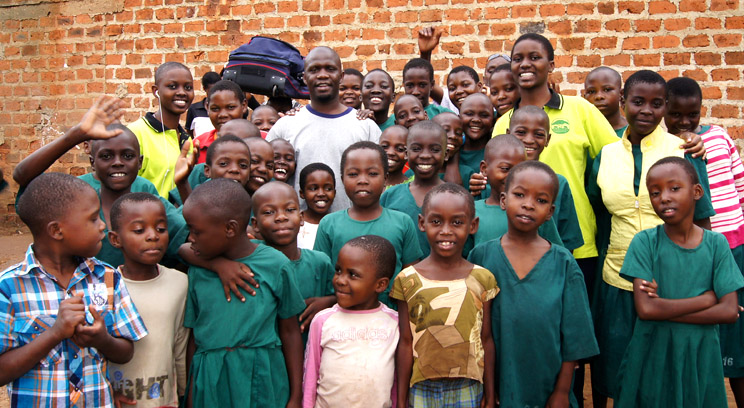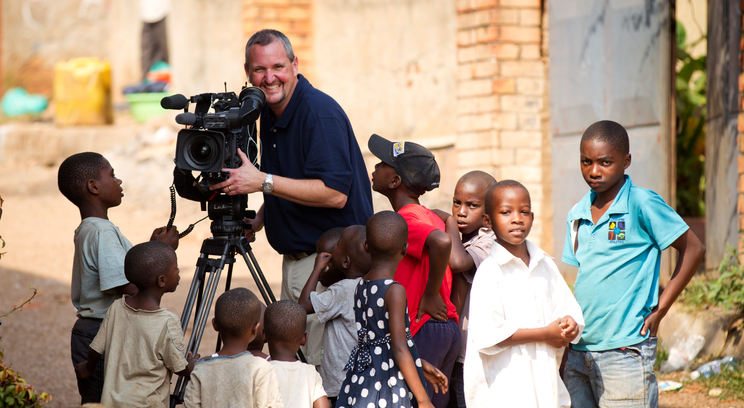KAMPALA, UGANDA - Ever since he was a child, Morgan Kisitu wanted to be a tour guide. He loved animals and he loved to travel, so it made imminent sense that he would end up right where he is today - as president of 1000 Shades of Green Tour and Safari Co.
But the path to arrive there is far different from the one most Americans would follow. An intuitively smart young man growing up in Uganda, Kisitu lacked the education, business acumen and finances to carry out his dream.
Enter St. Thomas and a chance meeting seven years ago between Kisitu and Father Dennis Dease, who was in Kampala on business. Kisitu was working as a guide and driver, and Dease asked him why he didn’t go to college. His response: he couldn’t afford it.
Read more from St. Thomas magazine
"He called me later and asked me if I was really interested in going to school," Kisitu said. "I said yes, and he said he would see what he could do to help. Two weeks later, he sent me admissions information about St. Thomas. I was startled."
Kisitu applied. A strong letter of recommendation followed from New York Times East African Bureau Chief Marc Lacey, attesting to Kisitu’s intelligence and organizational and problem-solving abilities. Kisitu had served as driver, guide, translator and aide to Lacey and other reporters.
Kisitu arrived in Minnesota in 2006, took English Language Service classes on campus to brush up on his speaking and writing skills, and majored in entrepreneurship. He developed a business plan, graduated in December 2009, spent a year working in customer service at a Best Buy store and returned to Uganda to open 1000 Shades of Green, which offers safaris in Uganda, Kenya, Tanzania and Madagascar.
Mike Moore, director of the William C. Norris Institute in the Opus College of Business at St. Thomas, worked with Kisitu on his business plan. Kisitu obtained a $75,000 loan to start the business and today has two vans and two drivers to handle safaris and tours.
"The plan was well put together," Moore said. "Morgan knows the industry and the challenges he would face, and spent a lot of time examining how he would market his business through the web, tour groups and his St. Thomas connections."
Kisitu’s experience is similar to that of many other Ugandan students who matriculate at St. Thomas. They are highly intelligent and perceptive young men and women but they need a connection, a lucky break or an angel - and in Kisitu’s case, all three crystalized when he met Dease.
"Ugandans have a huge appetite for learning," Dease said. "They know the opportunities are limited, and it is like a small miracle for them to get a college education in the United States. They are grateful, and I know that they will make a huge contribution to society."
After receiving their undergraduate degrees, mostly in the sciences, engineering or business, Ugandans gravitate in one of three directions: they return to their homeland to find a job, stay in the United States for graduate school, often at St. Thomas, or remain in rhe United States indefinitely to work.
Kisitu, 33, wanted to return to Kampala to be with his family and to pursue his dream, and in the process became involved as a supporter of two nonprofit organizations. He gives Kibera Girls Soccer Academy in Nairobi 40 percent of his profits from referrals and 10 percent of other safari profits, and he contributes clothes, food and money to the Kumbaya Child Care Foundation, an orphanage.
"I want to make a difference in my community," he said. "I have been helped a lot. St. Thomas gave me a great opportunity - my education. I thought, ‘I have to keep this chain going.’ In Africa, there are so many people with so many needs. I can help the underprivileged here."
Charles Lugemwa feels the same way. When the 2003 master’s in software engineering alumnus returned to his job at the Uganda Revenue Authority, he decided to help recruit undergraduate students for St. Thomas and became involved in the Hope Medical Clinics.
"My prayer was, ‘How do I come back to Uganda and be a different graduate?’" Lugemwa said. "Many of us go to the United States to study and come back to work ... but how as a graduate can you make a difference in the community?"
Olivia Lunkuse wants to make a difference, too. She graduated in 2002 from Makerere University in Kampala with a degree in tourism and worked for a safari company and a travel agency, but got frustrated with the industry and decided on a career change.
She went to work in 2005 for Infectious Diseases Institute in Kampala. The institute, which does research and provides clinical resources for HIV-AIDS victims, intrigued her but she wanted to be more than a clerk. Her brother Peter Musimami, a 2004 master’s in software engineering alumnus who is a health information technology specialist in Uganda, told her about St. Thomas, and she enrolled in the Master of Social Work program.
Lunkuse, 33, interned with the Domestic Abuse Project, graduated in 2009 and worked for a year at Catholic Charities in Minneapolis before going home.
"My plan was to come back to the institute and incorporate the work of domestic abuse and how it interrelates with HIV-AIDS," she said. "But IDI said, ‘We don’t talk about that here. People come to IDI to get free medications, but this is not the place to talk about domestic abuse.’ I thought, ‘There has to be a way to get these women some help.’"
She decided to focus on gender-based violence issues and is seeking funding for her "Voice Project." She left the institute in January, volunteers at an HIV clinic and is doing research on a Makerere University project to examine the impact of global health initiatives on the health care system in Uganda.
"My dream is to create a center for women where they would be safe," she said. "I want to work with women who are abused, who are vulnerable. They need to find a way to deal with their situation. They don’t know their rights."
Albert Kertho and Godino Kalungi, who graduated from St. Thomas last December with degrees in biology and biochemistry, respectively, are in graduate school and medical school with every intention of one day working in Uganda.
Kertho, 24, grew up on a farm, attended a Catholic high school in Kampala and chose St. Thomas over three other Midwest schools because he knew other Ugandan students here. He is in a master’s and doctoral program in plant pathology at North Dakota State University in Fargo in hopes of developing winter wheat resistant to leaf, stem and stripe rust diseases.
"Uganda is 80 percent farmland," he said. "It depends on agriculture for its livelihood. Food is grown mostly to eat. I want to see agriculture move to a higher level, to increase production by preventing diseases. Smaller farmers cannot afford to buy pesticides. They are living on $1 a day. If they can grow more crops, they can sell more.
"Every time I go home, I talk to farmers about their crops and the need to increase production. They don’t know how, but they will listen to me."
Kalungi, 25, began dual-degree medical doctor and master’s in public health studies in January at St. George’s University in Grenada. Sandy Grieve, a former St. Thomas trustee, and his wife, Flo, are paying for Kalungi’s room and board at St. George’s, which has a program for tropical medicine and has provided a full-tuition scholarship. After a five-year residency, likely in England, he hopes to create a network of clinics in Uganda for family and rural medicine.
"My dad died because he had no access to health care," said Kalungi, a graduate of St. Henry’s College, an all-boys Catholic high school. "Many villages don’t have doctors, or the nurses are overwhelmed with work because there are so many patients. This has to change, and I can help make a difference."
Doryne Tunanukye and Francis Ssennoga are alumni who have remained in the Twin Cities, for now.
Tunanukye, 27, grew up in Kampala and, with her sister Mavreen Ananura, followed their brother to St. Thomas in 2004. The sisters each hold bachelor’s and master’s degrees from St. Thomas - Tunanukye in electrical engineering and software engineering and Ananura in accounting and business administration.
"I like to make things work, to handle something from concept to completion," said Tunanukye, a project engineer at Wunderlich Malec in Minnetonka since 2008. She expects to eventually return to Uganda "once I have the skills to be independent" because she wants to own a company.
St. Thomas taught her more than just book skills but also "how to work on a team and ask questions," she said. "The professors were so open, and classes were small enough that we could get one-on-one instruction. That was a huge plus."
Ssennoga’s aunt, who works in the Binz Refectory at St. Thomas, encouraged him to enroll here. The one-time seminarian and photographer earned bachelor’s and master’s degrees in computer science and software engineering before founding Ssensoft, a software applications consulting company. He is serving a two-year term as president of the Uganda North American Association.
"St. Thomas gave me the opportunity to acquire knowledge that I would not have received in Uganda," he said. "St. Thomas taught me how to do things - to build things that help people. It also gave me role models like Dennis Dease and Patrick Jarvis (a computer science professor)."
He is unsure if he ever will move back to Uganda, but his company and his association work provide the opportunity to accomplish two objectives. "I want to keep one foot in America," he said, "and one in Uganda."
Lugemwa speaks for all Uganda alumni and students when he reflects on the value of a St. Thomas education.
"The greatest gift is the gift of education," he said. "I have utilized it, and it’s helping everybody here in my country. People are seeing what we are doing, learning from us and benefiting from the same gift. Everything else can go away, but that gift never will go away."





